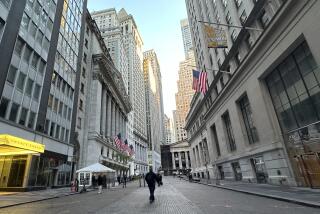Blue Chips Boost Dow; Bond Yields Fall : Market Overview
- Share via
Sellers savaging the drug and technology shares pushed most stock indexes lower on Thursday but the blue-chip index managed to muster a small gain.
* Long-term Treasury bond yields fell for a sixth straight session.
* The dollar rose against most major currencies amid turmoil in the European markets.
Stocks
Solid gains in a handful of blue chips boosted the Dow Jones 8.38 points higher to close at 3,550.93, nearing its all-time high of 3,554.83 reached on May 27.
The broader market did not fare as well, however, as investors sold to collect recently amassed profits. Declining shares edged out advances on the New York Stock Exchange by about 10 to 9.
The NYSE composite index fell 0.39 to 248.96; the American Stock Exchange market value index fell 0.69 to 437.98; and the NASDAQ composite index ended at 708.69, backing off 3.80 points from the record level reached on Wednesday.
Volume on the floor of the Big Board came to 271.81 million shares, down from 297.43 million on Wednesday.
Market analysts said the run-up on Wall Street Wednesday created an irresistible incentive for profit taking on Thursday.
Among the hardest hit groups were stocks of oil, drug and forest products companies. Technology companies reporting second-quarter results also encountered heavy selling pressure.
* One casualty of an earnings-related selloff was Storage Technology, which was pounded down by 7 7/8 to 33 1/4 in heavy NYSE trading. The drubbing came a day after the company reported an 80% drop in second-quarter earnings due to stiffer competition and weak overseas economies that pinched sales.
* Pharmaceutical issues sagged after several major drug makers gave ground in foreign trading. One reason investors dumped drug stocks was that the brokerage Smith Barney Harris Upham & Co. scaled back the group’s ratings. Two active NYSE drug stocks included Merck, which lost 1 to 33 3/4, and Bristol Meyers Squibb, which dropped 2 1/8 to 58.
* Among stocks making news, Procter & Gamble fell 7/8 to 51 5/8. The consumer products company announced it will close 30 plants and eliminate 13,000 jobs worldwide over three to four years to cut costs and stay competitive.
* Substantial gains in several blue-chips accounted for much of the total increase in the Dow industrials. Minnesota Mining & Manufacturing climbed 2 1/4 to 110, J.P. Morgan jumped 1 7/8 to 71 3/4 and American Telephone & Telegraph added 1 3/8 to a new 52-week high of 64.
In earlier overseas action, stocks were mixed and provided little clear direction to steer U.S. traders one way or the other.
Tokyo’s 225-share Nikkei finished up 18.91 points at 20,158.02. Frankfurt’s 30-share DAX average closed down 3.89 points at 1,807.66 and in London the Financial Times 100-share average finished 0.6 lower at 2,831.7.
Credit
The easing of inflation tensions that drove Treasury prices sharply higher Wednesday continued as oil prices traded at three-year lows. However, the bond market’s momentum lost some steam due to a decline in purchases by cities and states using Treasury bonds to refund higher yielding debt.
The Treasury’s main 30-year bond yield fell to 6.55%. Its price, which moves in the opposite direction, rose 1/16 point, or 63 cents per $1,000 in face value.
On Wednesday, the bond’s yield dropped to 6.56% after the Labor Department reported that consumer prices were flat in June, reinforcing sentiment that inflation pressures are not an immediate threat.
That sentiment remained prominent on Thursday as oil price futures sunk to new three-year lows in early trading. While oil prices ended slightly higher on the day, they remain at levels nearly 20% lower than highs reached in March.
Kevin Logan, chief U.S. economist at Swiss Bank Corp., said bond market participants are now paying attention to the oil price declines of recent months after being distracted by rises in other commodities prices.
“Three-year lows in oil is the kind of thing that headlines are made of,” Logan said.
Bond prices tend to be supported by such news since high inflation can hurt the value of investments that pay a fixed rate of return.
Also giving a slight lift to bonds was the Federal Reserve Bank of Philadelphia’s July index of business conditions, which showed weakness and seemed to support the view of a non-inflationary economy.
Economists said that the market’s ability to hold onto Wednesday’s gains indicated underlying strength, since relatively few participants were selling Treasury bonds to cash in on their recent price rise.
The federal funds rate, the interest on overnight loans between banks, was 3.125%, up from 2.938% on Wednesday.
OTHER MARKETS
The dollar thrived on the rumors and realities of currency intervention and uncertainty in Europe.
There were rumors in the morning, ultimately unfounded, that the Danish government was going to devalue the krone. That set the stage for extreme selling of the currency, Smith said.
That in turn gave rise to unfounded rumors that the German Bundesbank was going to lower its repo rate, or the rate for repurchasing money market securities as a way to supply banks short of cash with fresh money.
“That was the rumor that sent the dollar higher,” said Amy Smith, a market strategist for the IDEA economic consulting group. “There’s always attraction for the dollar whenever there is chaos in the world.”
The dollar closed at 108.01 Japanese yen in New York, up from 107.10 yen Wednesday. It rose to 1.721 German marks, up from 1.715.
Elsewhere, gold prices rose in commodities trading. On New York’s Commodity Exchange, gold for current delivery settled at $393.40 an ounce, up $2.50 from Wednesday. Silver traded late at $5.045 an ounce, up from $4.936 an ounce Wednesday.
Energy prices on the New York Mercantile Exchange ended marginally higher after slipping during a technical selloff. Light sweet crude oil for August delivery settled 18 cents higher at $17.67 a barrel.
Market Roundup, D6
More to Read
Inside the business of entertainment
The Wide Shot brings you news, analysis and insights on everything from streaming wars to production — and what it all means for the future.
You may occasionally receive promotional content from the Los Angeles Times.










